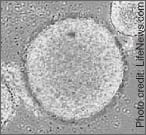Return to Human Cloning and Stem Cell Research
What is a stem cell?
Stem cells serve as a repair system for the body. They have the remarkable potential to develop into many different cell types, and they can replenish other cells. When a stem cell divides, each new cell has the potential to either remain a stem cell or become another type of cell with a more specialized function, such as a muscle cell, a red blood cell, or a brain cell.
What are the unique properties of all stem cells?
Stem cells differ from other kinds of cells in the body. All stem cells – regardless of their source – have four general properties.
- They are capable of dividing and renewing themselves for long periods.
- They are unspecialized.
- They can morph into specialized cell types (also known as differentiation).
- They can transform into cell types of a completely different tissue (also known as plasticity).
What types of research use stem cells?
- Cloned embryonic stem cell research
- Embryonic stem cell research
- Fetal stem cell research
- Adult stem cell research
Why is the difference between the types of stem cell research so important?
Human stem cells can be derived form various sources, and each of those sources encompasses unique ethical considerations. In order to appropriately address and dialogue about stem cell research, one must be clear about which type of stem cell research is being considered. There are numerous types of stem cell research that do not require the destruction of innocent human life.


